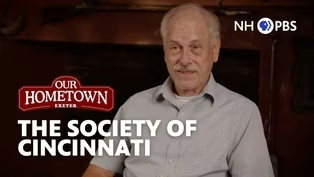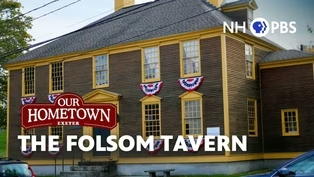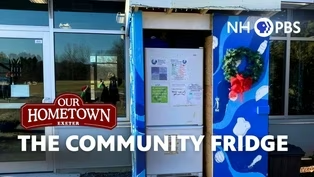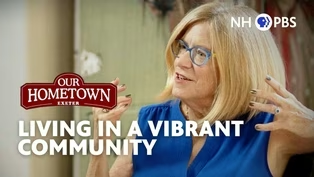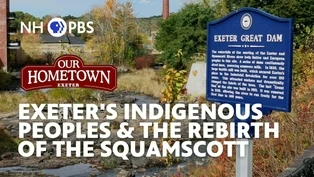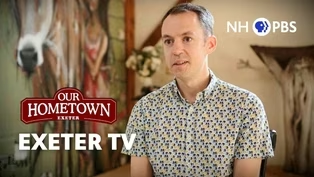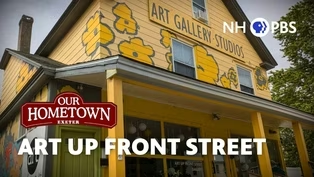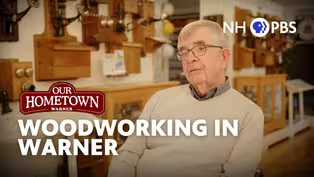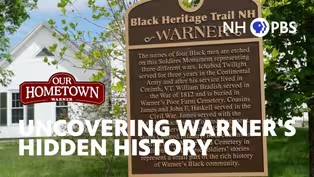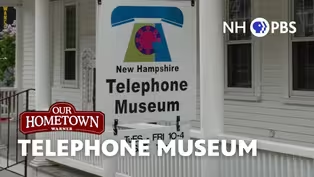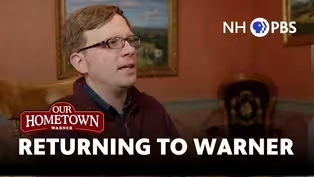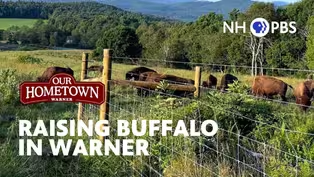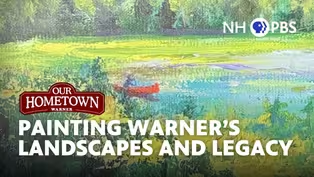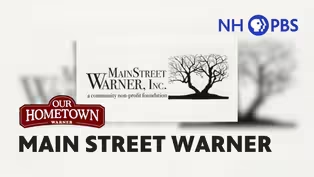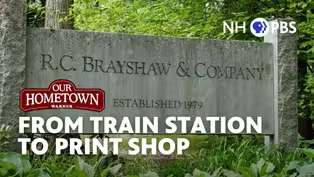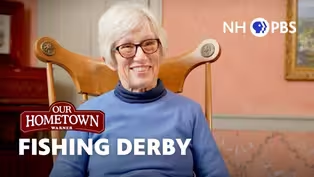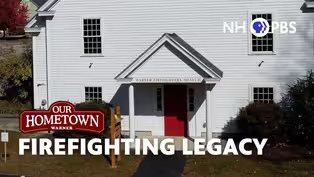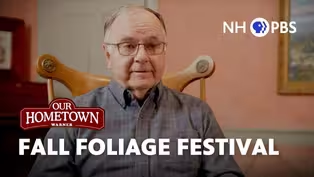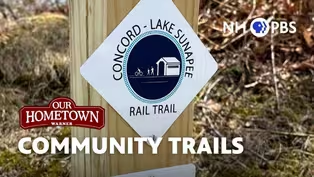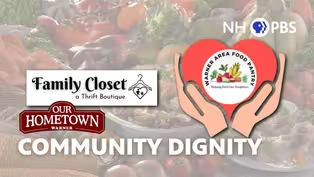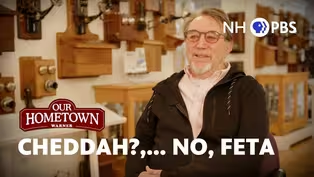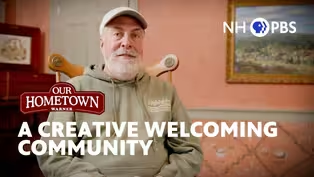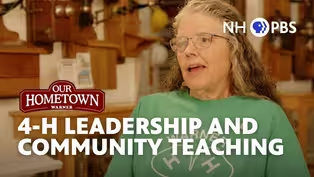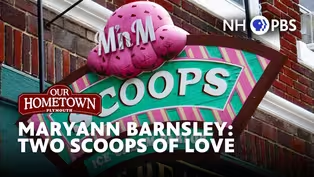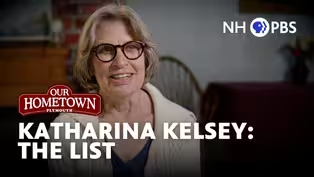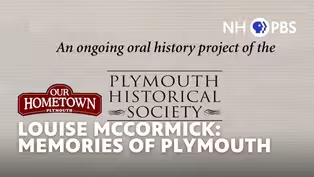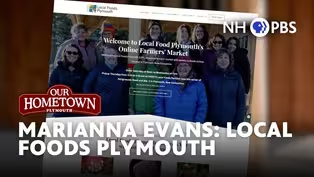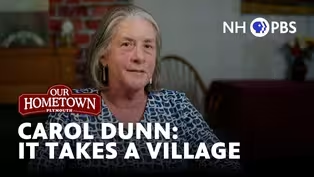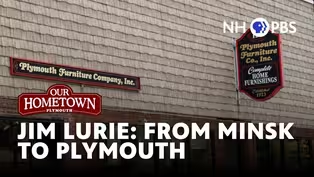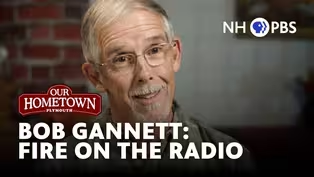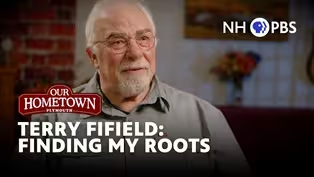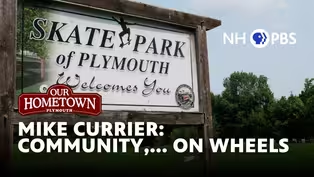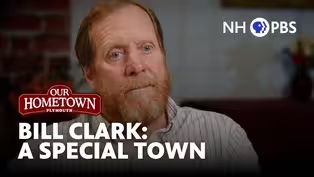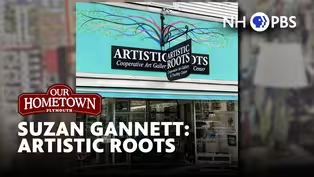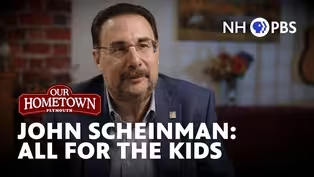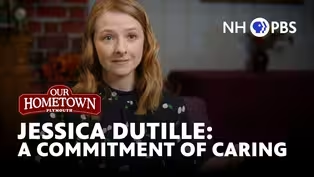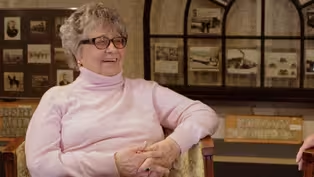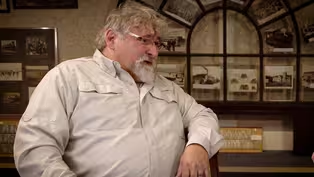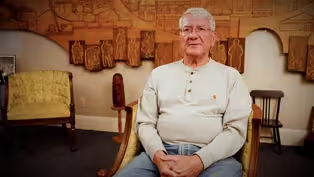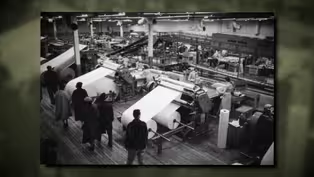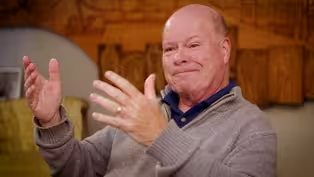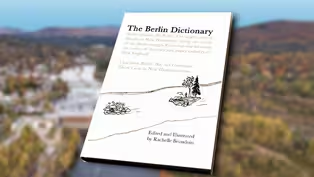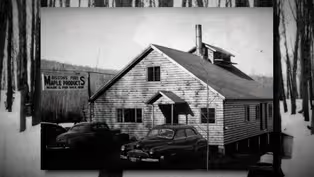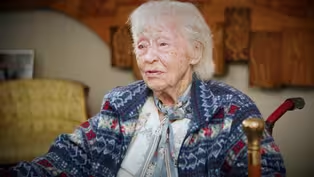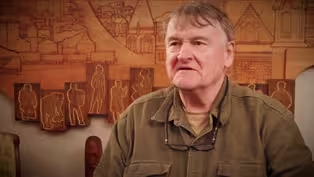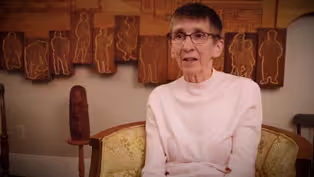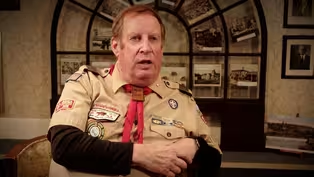Warner | Uncovering Warner's Hidden History
Clip | 5m 7sVideo has Closed Captions
Discover Warner’s untold Black history with local historian Rebecca Courser.
Rebecca Courser, a Warner native and past director of the Warner Historical Society, shares her journey researching Black history in Warner, NH, documenting 174 people of color between 1775-1920, including Revolutionary War veteran Ichabod Twilight and other notable residents who contributed significantly to the community despite facing racial challenges.
Problems playing video? | Closed Captioning Feedback
Problems playing video? | Closed Captioning Feedback
Warner | Uncovering Warner's Hidden History
Clip | 5m 7sVideo has Closed Captions
Rebecca Courser, a Warner native and past director of the Warner Historical Society, shares her journey researching Black history in Warner, NH, documenting 174 people of color between 1775-1920, including Revolutionary War veteran Ichabod Twilight and other notable residents who contributed significantly to the community despite facing racial challenges.
Problems playing video? | Closed Captioning Feedback
How to Watch
is available to stream on pbs.org and the free PBS App, available on iPhone, Apple TV, Android TV, Android smartphones, Amazon Fire TV, Amazon Fire Tablet, Roku, Samsung Smart TV, and Vizio.
My name is Rebecca Courser.
I'm a Warner native.
For several generations, and I'm past director of the Warner Historical Society.
And I've been a volunteer there for many, many years.
And probably about 30 years ago, I got a phone call.
A man was asking me a question about the soldiers monument, and he goes, can you tell me anything about Ichabod Twilight, who served in the American Revolution?
And I said, well, no, I can't off the top of my head.
But I went to Walter Harriman's History of Warner.
And yes, Ichabod is listed with the American Revolutionary soldiers.
He's listed in the 1775 census under the column, Negro or slave.
And since then, I can document 174, people of color living in Warner between 1775 and 1920.
That's as far as I've gotten so far.
There are three other names on the Soldiers monument.
There's William Bradish, who served in, the War of 1812.
His father was a blacksmith in Litchfield, New Hampshire.
He had a good job that allowed him to make money.
He bought land, came to Henniker and died in Henniker in 1808.
Two cousins by the name of John and James Haskell, served in the Civil War.
James served in the 54th, the famous 54th, and his cousin served in the 45th Colored Infantry.
Both of them served and came back here.
Unfortunately, James died of TB, a few years later.
And John dies, early, early 1900s.
He's fishing.
He's fishing on Tucker Pond and somehow fell out of the boat, and drowned.
And then we have Anthony Clarke, who is not on the monument because he served from Dracut, Massachusetts.
But he's important.
He's important because he had so many children that lived here and married into other families.
So he's a great story to follow.
And he was a cordwainer, a laborer.
But the most important thing was he was a fiddler.
He was probably a fiddler.
During the Revolution.
He was compatriot of Sampson Battis from Canterbury.
He marries.
We feel he married Sampson's daughter or at least a relative of Sampson by the name of Lucy, and he shows up playing the fiddle at musters.
He holds dance, lessons at taverns.
Augusta Worthen from the, Sutton town history writes about Anthony playing at the muster field farm gatherings, and he taught the children of Sutton their social graces, as she says, and Caesar Louis and Anthony would be dressed in their finest with powdered hair.
She just describes a beautiful scene there at the, ballroom at Muster Field Farm.
So he had an important part, in bringing people together.
There's also another black man that lived in Warner by the name of Prince Hastings.
I do not know if he was a war veteran, but he also, ends up at the poor farm and is buried in that cemetery.
It's unmarked, but we know it's that is listed there.
The poor farm was in existence in Warner.
The first one lasted a year because it was in such a remote area.
And then they bought a farm on Pumpkin Hill.
I want to say, 1840s till about 1880 something.
And then they sold the poor farm and people were transferred over to the county farm.
We knew at the beginning of this project there were five people buried there.
Two were black, one was British.
We did ground penetrating radar and found like 14 more people buried there than what we originally thought.
We have a cemetery down, on Poverty Plains Road, where it's unknown who's buried there.
But oral history says it was black people that were buried there.
So we've been researching deeds, people's written history of Warner to try to figure out who was buried there.
Exeter | The Society of Cincinnati
Video has Closed Captions
Clip | 6m 13s | Dana tells us about the genesis of the Society of Cincinnati in New Hampshire. (6m 13s)
Video has Closed Captions
Clip | 5m 57s | Rebeccah tells us about the beautiful architecture & rich history of the Folsom Tavern. (5m 57s)
Video has Closed Captions
Clip | 4m 11s | Alexis Cargill speaks about the Community Fridge; a self-serve food clearinghouse. (4m 11s)
Exeter | Living in a Vibrant Community
Video has Closed Captions
Clip | 3m 30s | Cathleen Toomey talks about moving to, and living in such a diverse, thriving community. (3m 30s)
Exeter | Indigenous Peoples & the Rebirth of the Squamscott
Video has Closed Captions
Clip | 6m 28s | Denise and Paul Pouliot tell us about the indigenous roots of many of the area names. (6m 28s)
Video has Closed Captions
Clip | 5m 21s | Bob Glowacky tells us about the many things that Exeter TV is doing to connect & build community. (5m 21s)
Video has Closed Captions
Clip | 4m 39s | Rose talks about the vibrant art community in Exeter, and how she started her studio & gallery. (4m 39s)
Warner | Woodworking in Warner
Video has Closed Captions
Clip | 2m 10s | Jim McLaughlin shares how woodworking deepened his bond with Warner. (2m 10s)
Warner | Uncovering Warner's Hidden History
Video has Closed Captions
Clip | 5m 7s | Discover Warner’s untold Black history with local historian Rebecca Courser. (5m 7s)
Video has Closed Captions
Clip | 6m 22s | Graham Gifford shares how Warner’s telephone museum came to life—surprising all. (6m 22s)
Video has Closed Captions
Clip | 2m 53s | Ian Rogers shares how travel and Warner’s community shaped his independent spirit. (2m 53s)
Warner | Raising Buffalo in Warner
Video has Closed Captions
Clip | 4m 47s | Brian & Kira Farmer share why they moved to Warner and raise buffalo on their farm. (4m 47s)
Warner | Painting Warner's Landscapes and Legacy
Video has Closed Captions
Clip | 2m 17s | Artist Mimi Wiggin paints her family’s legacy and Warner’s landscapes and traditions. (2m 17s)
Video has Closed Captions
Clip | 7m 57s | Neil Nevins tells about their non-profit, "Main Street Warner". (7m 57s)
Warner | From Train Station to Print Shop
Video has Closed Captions
Clip | 5m 56s | Jeremy reflects on the vibrant life surrounding Warner’s beloved train station. (5m 56s)
Video has Closed Captions
Clip | 2m 24s | Nancy Martin shares funny, fishy memories from Warner’s kids’ derby. (2m 24s)
Video has Closed Captions
Clip | 5m 1s | The rich history of Warner's fire department. (5m 1s)
Warner | Fall Foliage Festival
Video has Closed Captions
Clip | 2m | Ray Martin reflects on decades organizing the Warner Fall Foliage Festival and service. (2m)
Video has Closed Captions
Clip | 3m 52s | Tim Blagden shares how Warner’s abandoned rails became a community trail vision. (3m 52s)
Video has Closed Captions
Clip | 7m | Apryl Blood and Patty Anderson discussing their roles in the community. (7m)
Warner | Cheddah?,... No, Feta
Video has Closed Captions
Clip | 4m 34s | Author David Elliott speaks about moving to Warner. (4m 34s)
Warner | A Creative Welcoming Community
Video has Closed Captions
Clip | 4m 7s | As a radio guy and author, Matt Esenwine talks about coming to Warner. (4m 7s)
Warner | 4-H Leadership and Community Teaching
Video has Closed Captions
Clip | 5m 41s | Susan Jenna and Abigail R. reflect on decades of 4-H leadership and community teaching. (5m 41s)
Video has Closed Captions
Clip | 3m 15s | Dan Salzer and Jonathon Picard talk about Pemi Baker TV. (3m 15s)
Video has Closed Captions
Clip | 3m | Maryann Barnsley tells us about a childhood dream. (3m)
Video has Closed Captions
Clip | 2m 1s | Katharina Kelsey and her husband made a list, Plymouth checked all the boxes, and so much more. (2m 1s)
Plymouth | The Happiness Quest
Video has Closed Captions
Clip | 2m 34s | Dr. Marie Sanders relates what can happen when an entire town works together to discover happiness. (2m 34s)
Plymouth | Memories, Stories and Cake
Video has Closed Captions
Clip | 5m 41s | Patricia Hoyt came to Plymouth for college, launched her career here. (5m 41s)
Plymouth | Memories of Plymouth
Video has Closed Captions
Clip | 1m 55s | Louise McCormick is a townie. She grew up in Plymouth, and has spent most of her life here. (1m 55s)
Plymouth | Local Foods Plymouth
Video has Closed Captions
Clip | 3m 23s | Marianna Evans talks about Local Foods Plymouth, and how the pandemic helped to create a model. (3m 23s)
Video has Closed Captions
Clip | 2m 21s | Carol Dunn tells about how this amazing town bonded together to save her business on Main Street. (2m 21s)
Plymouth | From Minsk to Plymouth
Video has Closed Captions
Clip | 3m 41s | Jim Lurie tells us how in 1917, his grandfather travelled from Minsk, Russia, across Siberia. (3m 41s)
Video has Closed Captions
Clip | 1m 34s | Bob Gannett speaks about an interesting story unfolding as he was on the radio. (1m 34s)
Video has Closed Captions
Clip | 4m | Terry Fifield has lived in a lot of places, but found that the Plymouth area to be the best. (4m)
Plymouth | Community... on Wheels
Video has Closed Captions
Clip | 6m 14s | Mike Currier talks about the roots of the Plymouth Skate Park. (6m 14s)
Video has Closed Captions
Clip | 1m 45s | Bill Clark talks about, even with growth and progress, Plymouth is a special town. (1m 45s)
Video has Closed Captions
Clip | 4m 19s | Suzan Gannett talks about Artistic Roots, and the programs and passions that it has inspired. (4m 19s)
Video has Closed Captions
Clip | 2m 31s | John Scheinman shares how the skills needed in successfully coaching can be used. (2m 31s)
Plymouth | A Commitment of Caring
Video has Closed Captions
Clip | 5m 1s | Jessica Dutille talks about re-building community, after the pandemic changed the world. (5m 1s)
Video has Closed Captions
Clip | 4m 16s | Yvonne recalls growing up in Berlin, and speaking two languages in school. (4m 16s)
Video has Closed Captions
Clip | 6m 41s | Andre speaks to us about growing up in Berlin. (6m 41s)
Video has Closed Captions
Clip | 12m 40s | Walter tells us about Berlin's Skier/Soldier, Paul Petersen, and a love story. (12m 40s)
Video has Closed Captions
Clip | 3m 36s | Roland talks about working in every aspect of the paper industry, over 4+ decades. (3m 36s)
Video has Closed Captions
Clip | 4m 19s | Renney tells a couple of great stories about growing up in Berlin. (4m 19s)
Video has Closed Captions
Clip | 5m 37s | Berlin has a language all its own, and Rachelle decided to compile a dictionary of words. (5m 37s)
Video has Closed Captions
Clip | 4m 24s | Olive speaks about growing up in Berlin, in a family that owned Bisson's Sugar House. (4m 24s)
Video has Closed Captions
Clip | 3m 5s | Lorna recalls heading into Berlin on Friday nights, for shopping & meeting up with friends (3m 5s)
Video has Closed Captions
Clip | 3m 54s | Moving to Berlin was a dream come true for Haven, as he loved working in the woods. (3m 54s)
Video has Closed Captions
Clip | 2m 43s | Diane talks about going from a 45 year career in the banking industry. (2m 43s)
Video has Closed Captions
Clip | 6m 40s | Dennis tells the story of the history of boy scouts in Berlin, NH. (6m 40s)
Providing Support for PBS.org
Learn Moreabout PBS online sponsorshipSupport for PBS provided by:
